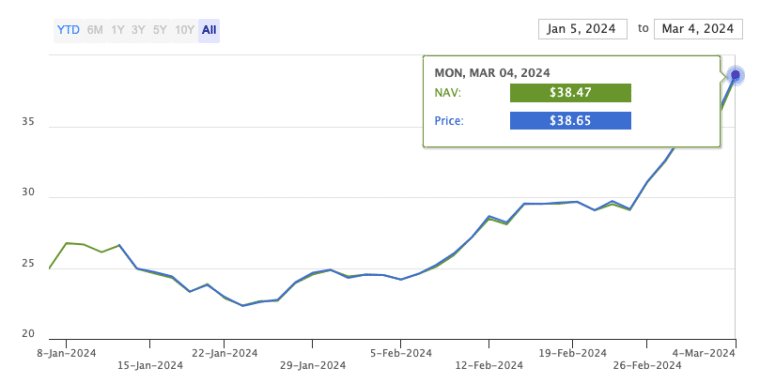In a world where conventional investments meet groundbreaking technology, Bitcoin Exchange-Traded Funds (ETFs) have ignited a financial excitement similar to the 1849 Gold Rush.
Picture a financial tool that merges the excitement of cryptocurrency with the reliability of established investments—this is the dawn of the Bitcoin ETF era. Led by giants like BlackRock and Fidelity, which have seen their assets soar into the billions, investors globally are taking keen notice.
This phenomenon transcends mere digital gold; it’s about transforming the essence of finance, investment, and savvy investing in today’s world. With a mix of innovation, regulatory shifts, and market movements at play, are we on the verge of a major investment breakthrough?
The Surge of Bitcoin ETFs
On January 11, the financial world saw a major shift with the introduction of Bitcoin ETFs, marking a new chapter for the cryptocurrency world. This was not only a milestone for digital currencies but also proof of Bitcoin’s growing acceptance as a genuine investment option.
Investors’ response was phenomenal, leading to a historic influx of funds into these new financial instruments. In the weeks after their launch, the total assets in the ten US-based spot Bitcoin funds soared to over $50 billion, highlighting strong investor confidence in the cryptocurrency sector.
This impressive growth of Bitcoin ETFs shows the huge untapped demand for cryptocurrency investments through conventional financial markets.
Previously, the complexity and security concerns of buying and holding cryptocurrencies directly deterred many potential investors. Bitcoin ETFs have bridged this gap, providing a safer and more straightforward way to invest in digital currencies.
The BlackRock and Fidelity Phenomena
BlackRock’s iShares Bitcoin Trust (IBIT) has seen a meteoric rise in the investment world, quickly amassing over $10 billion in assets, a record pace for a new ETF, demonstrating investors’ great trust and enthusiasm in Bitcoin and BlackRock’s cryptocurrency management.

This achievement not only highlights BlackRock’s leadership in the Bitcoin ETF market but also reflects the growing interest in cryptocurrencies as a legitimate asset class among mainstream investors.
Similarly, Fidelity’s Bitcoin ETF has made significant strides, gathering more than $6 billion in assets and becoming Fidelity’s third-largest ETF. This growth has notably contributed to Fidelity’s ETF inflows for the year, showing a strong and increasing interest in cryptocurrency investments among its clients.
The comparison between BlackRock’s and Fidelity’s ETFs shows the competitive environment of cryptocurrency investments, with both funds attracting considerable investor interest and capital, pushing the integration of digital currencies into the traditional financial ecosystem further.
Market Impact and Investor Sentiment
Experts hold a hopeful yet cautious view on the sustainability of this trend. Todd Rosenbluth from VettaFi notes the “persistent wave of demand” for these products, showing a strong initial performance that has continued. Yet, this trend’s future depends on regulatory changes, market sentiment, and wider cryptocurrency adoption in the financial system.
Analysts expect that as the market matures and more investors get acquainted with cryptocurrency through these regulated products, we might see more stable growth and less volatility. They also caution about possible corrections, stressing the need for strategic investment choices.
The general consensus among experts is cautiously optimistic, acknowledging Bitcoin ETFs’ transformative potential while noting the risks of an emerging and quickly changing market.
Regulatory Landscape and Future Outlook
The regulatory framework around Bitcoin and its ETFs is a key factor that will shape the future of cryptocurrency investments. Regulatory agencies, especially the Securities and Exchange Commission (SEC) in the US, are figuring out how to regulate these innovative products. Their decisions will have major effects on the market and investors.
- Current Regulatory Stance: The SEC is gradually becoming more open to Bitcoin and Bitcoin ETFs, indicating a significant move towards integrating cryptocurrencies into the conventional financial scene. This changing attitude highlights the recognized potential benefits and risks of digital currencies.
- Main Concerns for Regulators:
- Preventing market manipulation
- Protecting investors
- Ensuring transparency
- Future Regulatory Developments:
- The regulatory framework is expected to evolve, potentially leading to:
- Increased legitimacy and confidence among investors through stronger regulations
- A wider range of Bitcoin-related investment products, making the market more accessible
- The regulatory framework is expected to evolve, potentially leading to:
- Possible Effects:
- Positive: Better regulations might draw in more investors, supporting growth and stability in the cryptocurrency market.
- Challenges: Tougher compliance demands could place more pressure on issuers and investors, affecting the market.
In summary, the mix of innovation and regulation will crucially influence the direction of the cryptocurrency market. As regulations become clearer, they are likely to present both new opportunities and challenges, greatly affecting investor strategies and market development.
The Bottom Line
The debut of Bitcoin ETFs signifies a groundbreaking moment in finance, blending the dynamic world of cryptocurrencies with the structured realm of traditional investments. Looking at pioneering funds like BlackRock’s iShares Bitcoin Trust and Fidelity’s Bitcoin ETF, we see a clear narrative of swift asset growth, demonstrating a solid investor demand for digital currencies. This surge shows a wider shift in investor mood and a deeper integration of cryptocurrencies into mainstream financial strategies.
Yet, the path forward is closely tied to the changing regulatory landscape, with the SEC playing a key role in determining the future path of Bitcoin ETFs and the broader cryptocurrency market. Standing at this intersection of innovation and regulation, Bitcoin ETFs’ future holds both promising prospects and challenges, ready to redefine investment models and investor portfolios.
